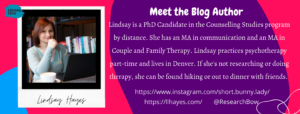
This blog was inspired by Hannah Kimler’s When your PhD Subject is Taboo. It caught my eye because my subject is also taboo in more conservative circles. I study polyamory and have been polyamorous for over a decade.
Unlike Hannah, listener reactions to my subject range from “That’s awesome!” in progressive or alternative circles to “Oh…” or “what’s that” in more conservative circles. It also “outs” me by implication.
Being loud and proud as a polyamorous person has been a slow transition for me. When my husband and I first opened up in 2011, it was a big secret. No one else we know had an open relationship, except the couple to whom we found ourselves attracted. As the years wore on, I learned to get a sense of who I could tell and expect a relatively positive reaction and who I simply didn’t want to tell.
In 2019 I decided to return to school and become a relational therapist (a more inclusive term than “couples’ therapist”). I knew I wanted to do my Master’s dissertation on polyamory and concentrate my work as a therapist on people who were polyamorous. I also learned the term internalized stigma, which was helpful for starting to untangle my feelings of shame and secrecy.
In 2019, I happened upon Mimi Schipper’s Beyond Monogamy at the Category Is bookshop in Glasgow (a wonderful LGBTQ bookshop BTW). She writes about intersectionality and I realized that as a white lady with no kids and a husband of 15 years, I was in a position to be “out” thereby making polyamory less taboo.

That book made me realize that I wanted to exercise my privileges to benefit others who did not have the same privileges. What could I do for those who still needed to hide their relationship status? I returned to school, got a Master’s in Couple and Family Therapy (while also pointing out the narrowness of “couple” in the program name). I also completed a thesis where I interviewed 9 people practicing polyamory. And I am continuing that study today.
These days, anyone who knows me knows what I study. Of course, that’s also a reflection of the fact that I live in a socially liberal city (Denver) and feel very safely “out” in Edinburgh on my yearly visits.
It’s when I am in less liberal or downright conservative places that I am reminded that I live in a bubble and there is still work to be done where advocacy is concerned. It is that advocacy that I am taking part in as a researcher. It’s harder to judge someone’s relationship choices when you see them as a real person. Oftentimes, this is why I am loud and proud these days. At 43 years old, it’s tough to dismiss my polyamory as a phase.
But that doesn’t mean I’m immune to the stigma, especially when a conservative place like my home state (Oklahoma, which is VERY conservative). Depending on how safe I feel (or how many f*cks I have left to give), I may or may not skirt the real answer about my research. But I always remind myself that if King David of the Old Testament can have 8 wives, I can have a husband and a boyfriend.

If you are interested in learning more about polyamory or nonmonogamy, or if you are looking for a psychotherapist who is experienced in working with people in these relationships, Lindsay suggests the following resources:



